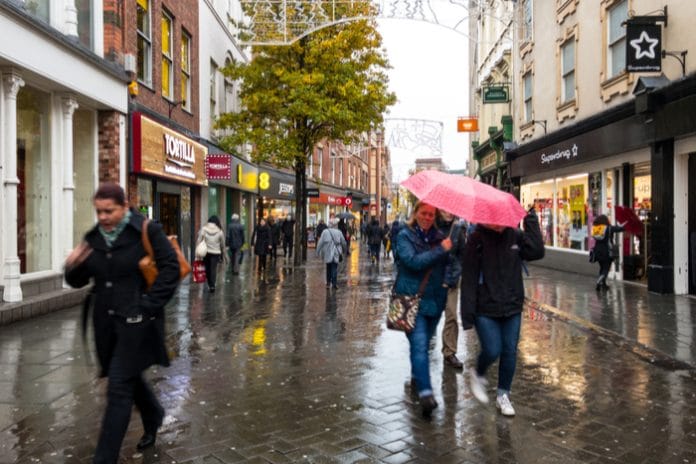

// Total retail sales increased 0.1% in February, according to the BRC-KPMG Retail Sales Monitor
// On a like-for-like basis, retail sales decreased 0.4% from February 2019
// Non-food sales increased 0.6%, but in-store non-food sales declined 1.8%. Food sales grew 0.3%
Shoppers’ spending on food and healthcare products increased towards the end of February amid concerns about coronavirus, according to an index.
However, spending on clothing was held down last month by the winter storms, the BRC-KPMG retail sales monitor said.
The findings were released as a separate report suggested nearly three in 10 UK adults were avoiding the high street and other busy places amid the spread of coronavirus.
READ MORE:
The BRC-KPMG research said that in February, total retail sales crept up by 0.1 per cent year-on-year, while on a like-for-like basis sales decreased 0.4 per cent compared with a year earlier.
Over the three months to February, food sales increased 0.3 per cent on a like-for-like basis and one per cent on a total basis.
This was below the 12-month total average growth of 1.2 per cent.
In the same three-month period to February, non-food retail sales in the UK increased by 0.6 per cent on a like-for-like and 0.7 per cent on a total basis.
This was above the 12-month total average decline of 1.4 per cent but positively distorted by the inclusion of Black Friday in December.
However, in the three months to February, in-store sales of non-food items declined 1.8 per cent on a total basis and 1.9 per cent on a like-for-like basis.
Despite the decline, this was better than the 12-month total average decline of 3.1 per cent but once again positively distorted by the inclusion of Black Friday in December.
“Clouds continued to hang over the retail industry in February, as storm Ciara, Dennis and Jorge took their toll on retail sales, particularly in fashion,” BRC chief executive Helen Dickinson said.
“Despite many indicators suggesting a rise in confidence among UK shoppers in recent months, this has failed to translate into higher retail sales.
“However, the end of the month saw a slight rise in spending on food and healthcare as a result of concerns around coronavirus.”
KPMG head of UK retail Paul Martin said: “The highly anticipated ‘Boris bounce’ has clearly struggled to materialise in the embroiled retail sector, and looking ahead Covid-19 isn’t likely to help matters.”
He added that the subdued grocery sector has shown a slight recovery.
“Although the edging up of prices will have contributed to that growth,” Martin said.
“In the short-term, any potential supply chain disruption caused by Covid-19 will be felt acutely by grocers, so developments will have to be watched closely.”
A separate report from Barclaycard, which sees nearly half of the nation’s credit and debit card transactions, said spending on airlines and travel agents decreased by 0.7 per cent and 0.3 per cent annually respectively in February.
Many consumers opted to stay at home with a box set and a takeaway, as digital content and subscriptions saw spending growth of 12.4 per cent and takeaways and fast food spending increased by 8.7 per cent annually.
Supermarket spending saw a 1.3 per cent annual increase, while spending on clothing dipped by 1.7 per cent annually, Barclaycard said.
Consumer research from Barclaycard also found fears surrounding coronavirus led to 28 per cent of people avoiding the high street and other busy places.
More than a third (36 per cent) of adults surveyed also said they are being careful with their money and more than half (54 per cent) are worried about the rising prices of everyday items and how this will impact their ability to spend.
“Storms, floods and fears about the spread of coronavirus have kept many Brits away from the high street this month,” Barclaycard director Esme Harwood said.
“Despite this, broader consumer spending has held up as people put their money towards enjoying a takeaway and digital subscriptions.”
with PA Wires
Click here to sign up to Retail Gazette‘s free daily email newsletter

